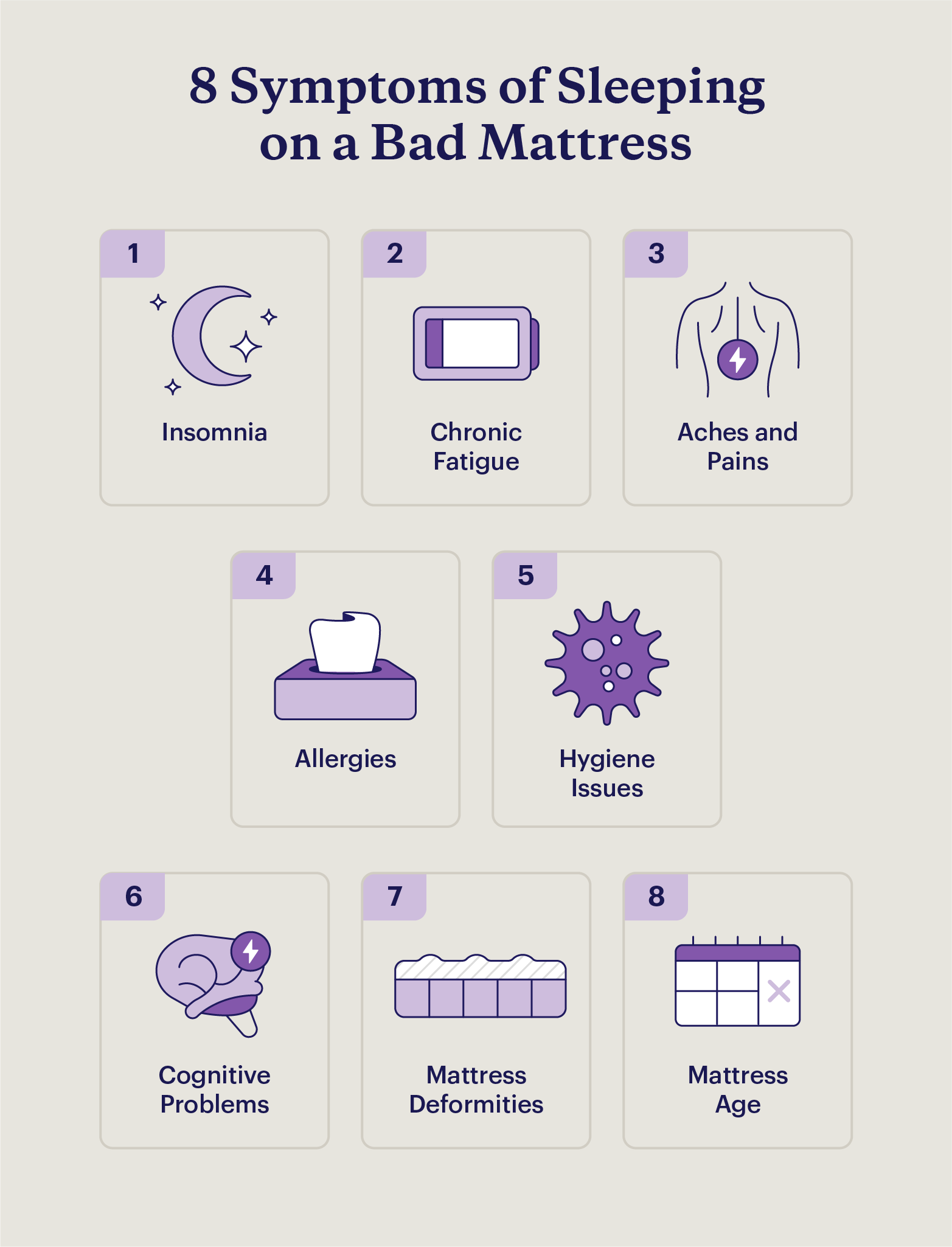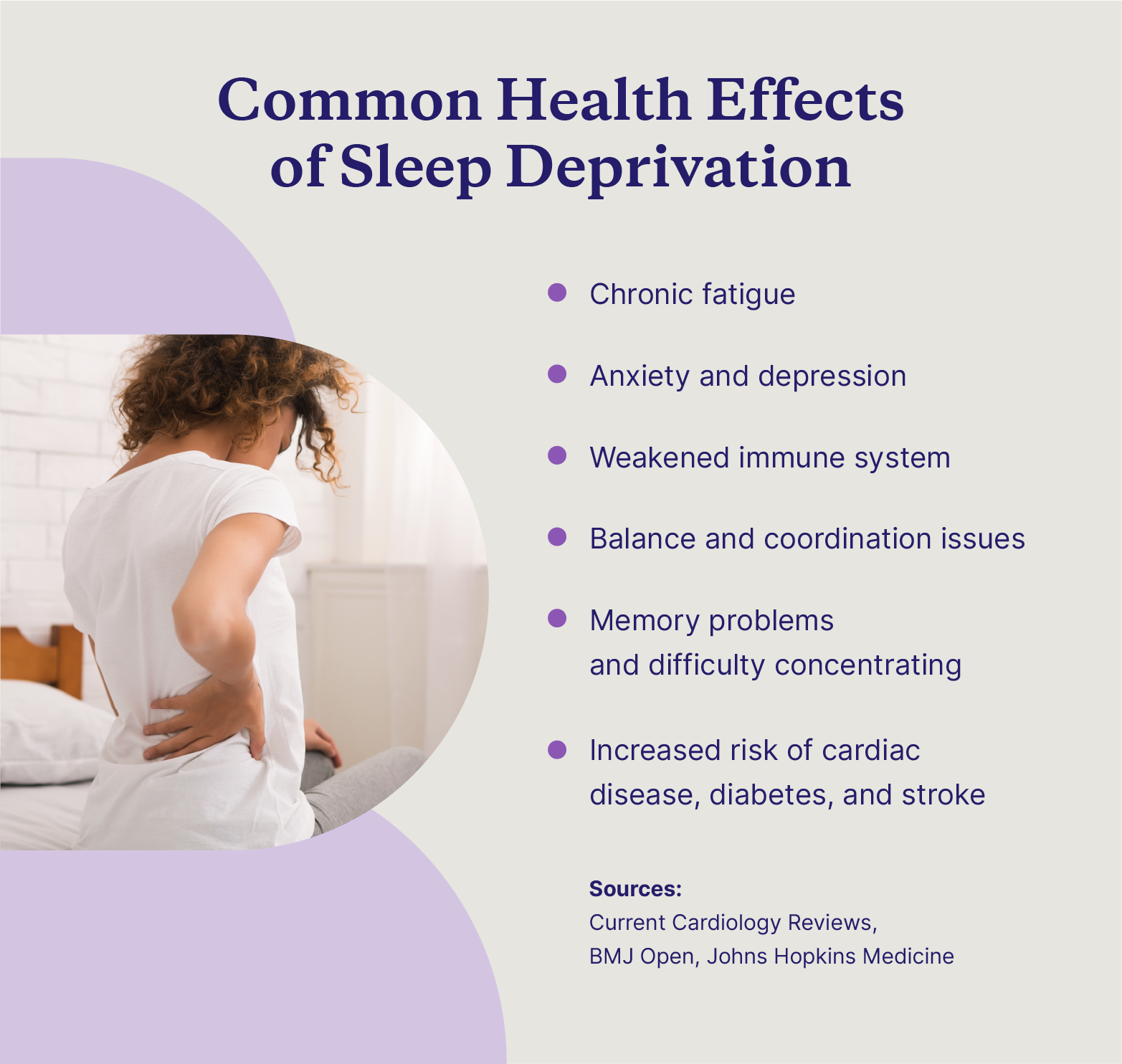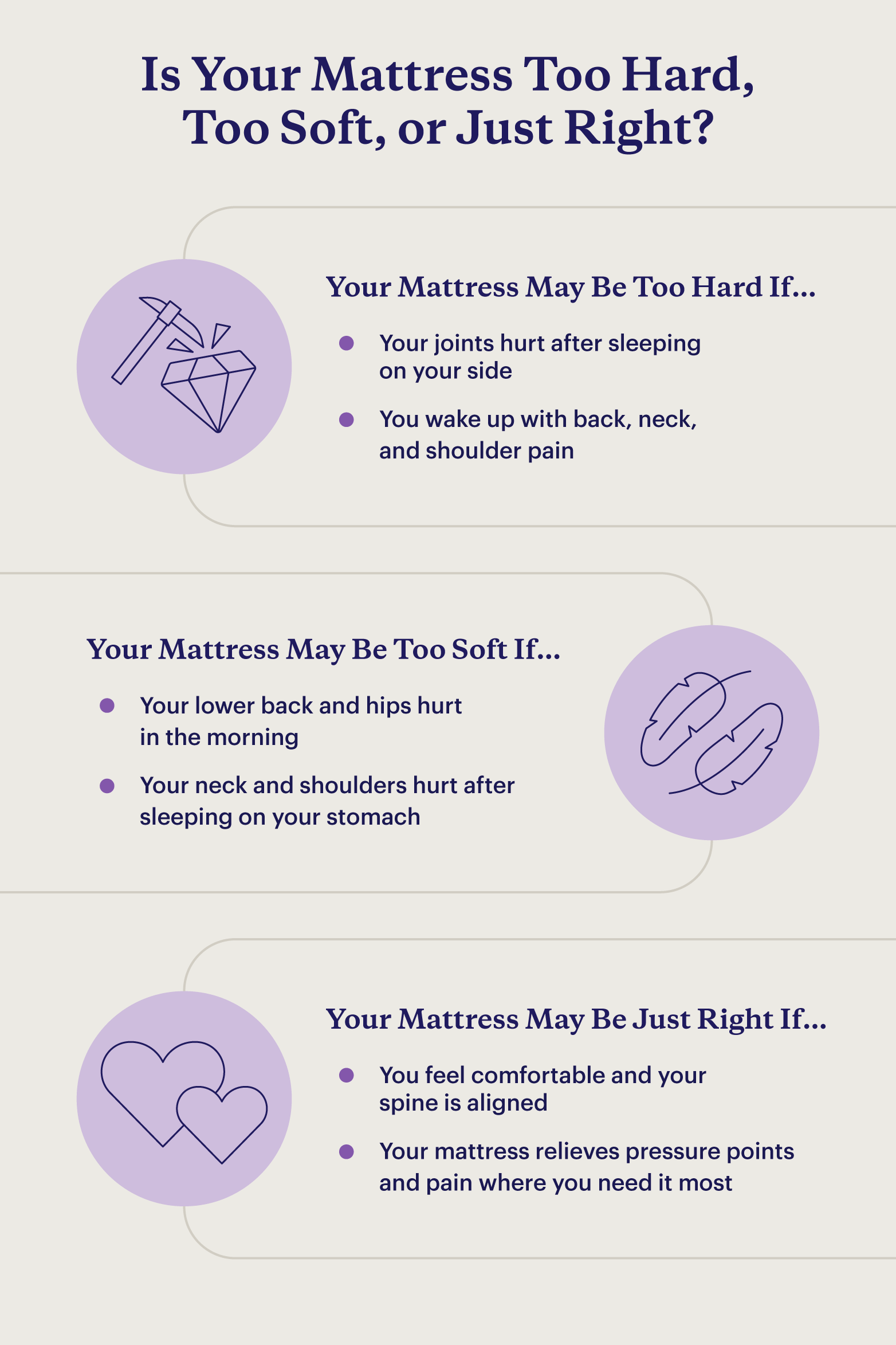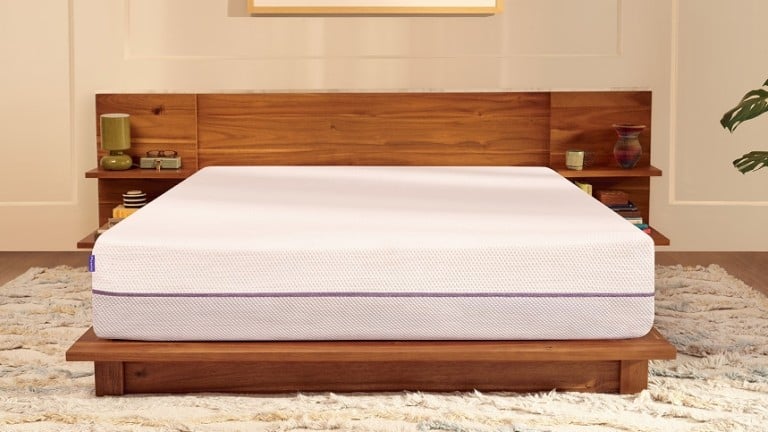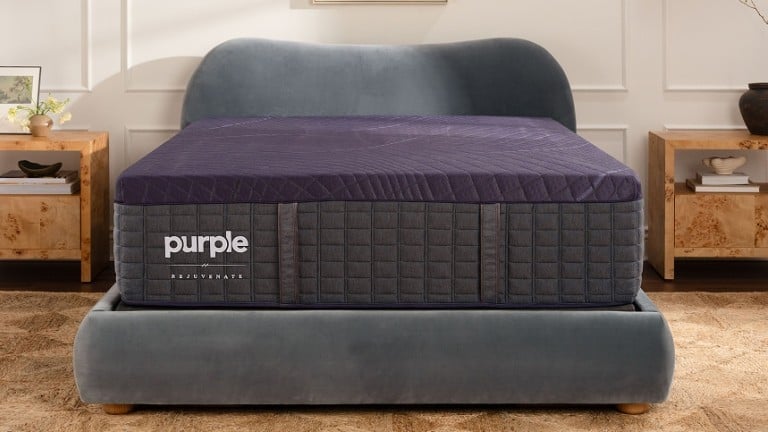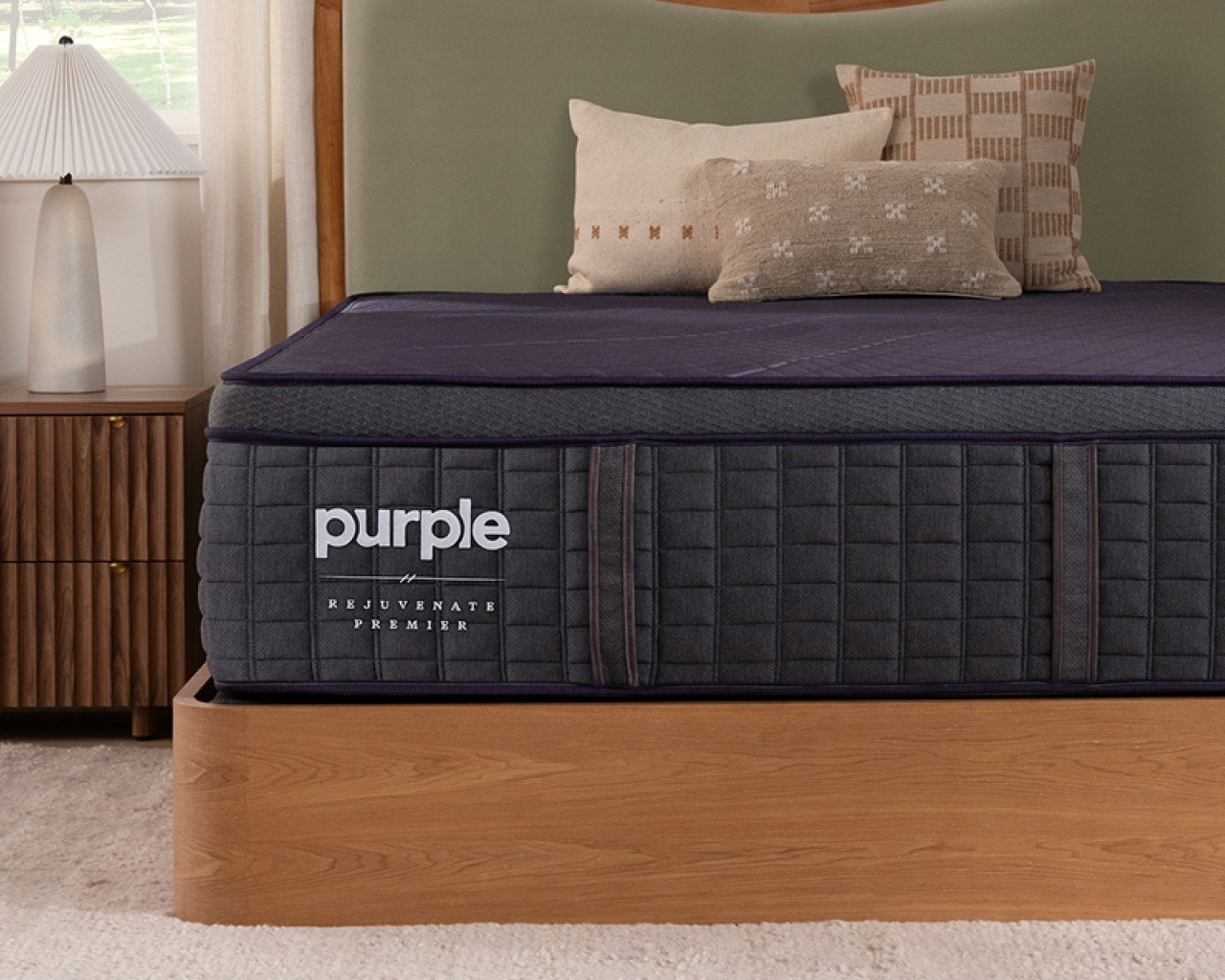
8 Clear Signs and Symptoms of Sleeping on a Bad Mattress
You may be sleeping on a bad mattress if:
- You don’t feel rested and can’t sleep well
- You’re achy and sore after sleeping
- You’re itchy or sneezing more than usual
- Your mattress is lumpy, moldy, or smelly
- Your mattress is more than 10 years old
If you’re not sleeping well at night, you may be wondering if your mattress is the cause. There are specific signs you can look for that may indicate your mattress is contributing to your poor sleep quality. If you are experiencing the signs and symptoms of sleeping on a bad mattress, it may be time to upgrade to a new one.
When replacing your mattress, opt for one that provides adaptive, contouring support to meet your unique sleep needs. Purple mattresses feature our proprietary GelFlex® Grid for maximum comfort, cooling, and targeted support for every sleep position and preference.
Before blaming your mattress for symptoms like fatigue and insomnia, be sure to rule out other potential causes, including:
- Sleep disorders: Conditions like sleep apnea may result in disrupted sleep and poor sleep quality. If you’re experiencing sleep apnea symptoms like abnormally loud snoring, you may want to consult your doctor.
- Lack of exercise: Exercising throughout the week can improve your sleep quality, but a lack of exercise can cause restlessness. You should avoid exercising right before bed, as intense exercise can keep you up.
- Nighttime habits: Some activities, like using your phone right before bed, can disrupt your sleep. Try adjusting your nighttime routine to limit overstimulation and help improve sleep quality.
- Diet: You may experience disrupted sleep if you have greasy or spicy food in the evening. You can adjust your diet by eating foods that may help you sleep better to see if that improves the quality of your sleep.
If none of these apply, your mattress may be part of the problem.
Read on to learn the eight symptoms of poor mattress quality that warn you it’s time to replace your mattress, plus the impact of poor mattress quality on sleep quality.
1. Insomnia
Your mattress may not be the sole reason you can’t fall asleep, but if you consistently can’t get comfortable in bed at night, white noise playlists and nighttime stretches may not be enough to fix the issue.
Some people experience difficulty falling or staying asleep because of medical conditions, stress, or caffeine and alcohol consumption. But if you can’t confirm the source that’s keeping you up, your mattress may be the cause.
An old pillow and mattress that don't support your spine or provide pressure relief may prevent you from getting comfortable. As a result, it may take you longer to fall asleep, which can affect your sleep quality, energy levels, and mood. You may find that you don’t remember your dreams as much as you used to as a result of sleep disruptions during REM sleep — over 20% of Americans report that insomnia or a lack of sleep negatively impacts their dream recall.
2. Chronic Fatigue
Waking up tired more often than not may be a sign of a bad mattress. You may find yourself waking up throughout the night or tossing and turning because you can’t get comfortable. Over time, disrupted sleep can affect your energy levels, mood, and ability to focus, sometimes resulting in chronic fatigue. Since long-term sleep deprivation can increase your chances of cardiovascular disease and other health issues, chronic fatigue can be a serious condition.
While there may be other underlying causes of your fatigue, these symptoms may indicate that you're sleeping on an uncomfortable or old mattress.
3. Morning Aches and Pains
One of the most common signs of a bad mattress is waking up with chronic pain. Body pain may be caused by underlying medical issues like nighttime sciatica flare-ups, but some sleepers may find that sleeping on bad mattresses is responsible for their morning body aches.1
Over time, your mattress will start to lose its shape and structure, which can cause discomfort as you get less relief for your pressure points and less support for the rest of your body. The lifespan of a mattress varies based on the type and quality of materials used as well as the construction of the mattress, but if your mattress is causing you pain, it may be time to replace it.
Some sleepers may not choose the right type of mattress for their needs, resulting in discomfort even when the mattress is brand-new.2 A too-soft or lumpy mattress, for example, may sag or dip where your body needs the most support, like your hips and lower back, which can cause back pain, body aches, and stiffness. If you struggle with certain health conditions that cause pain, you may be able to buy a new mattress using your HSA or FSA.
4. Allergy Symptoms
Are you kept awake by sneezing, itching, or a runny nose? Your old mattress may be the culprit.3 Mattresses tend to harbor dead skin cells, dust mites, and other contaminants that agitate allergies and make it harder to breathe throughout the night. Look for signs of fleas in bed to rule them out before assuming your symptoms come from allergies. With proper care, such as regular cleaning and the use of a mattress protector, this issue can be mitigated.
The older your mattress is, the more likely it is to have dust mites, mold, mildew, and pet dander, which can cause allergic reactions or asthma attacks. If you’re experiencing allergic reactions and can rule out common allergens like pollen, your mattress may be the problem.
If you’re extremely sensitive to household allergens, looking into the best sheets for allergies may be worthwhile. Even with proper care, mattresses accumulate dust, dirt, and dead skin cells over time, so it’s important to replace your mattress once it’s past its prime.
5. Hygiene Issues
Your mattress may accumulate more than just dust mites over time, which can result in hygiene issues that may affect your health.
Apart from shedding skin cells, we also sweat at night. Whatever sweat doesn't evaporate is absorbed by your mattress, promoting mold and mildew growth. Opting for one of the best mattresses for night sweats can not only keep you cooler but also help protect your mattress from accumulated moisture.
Even if you’re vigilant about washing your bedding and spot cleaning your mattress, the older your mattress is, the more irritants it likely contains. Look for signs of mildew and mold on your mattress like:
- Dark, slimy, or fuzzy spots
- Musty smells
- New stains
- Mold or mildew in other areas of your bedroom
- Coughing, sneezing, or congestion
- Itchy or watery eyes
- Persistent rashes or headaches
Mold and mildew can agitate your respiratory system, causing allergic reactions or cold-like symptoms.4 If you suspect your mattress has mold, take steps to clean your mattress or replace it to prevent long-term health issues.
6. Cognitive Problems
If you can’t fall or stay asleep or you toss and turn all night, your sleep quality will suffer, impacting your cognitive function. The longer you try to sleep on a bad mattress, the more you may find you have memory problems and difficulty concentrating.5
You may also experience symptoms of depression, anxiety, or excessive anger due to insufficient or low-quality sleep.6 Poor sleep can also affect your mood and libido. If you’re experiencing cognitive problems, you may want to talk to your doctor to rule out other causes. But if you aren’t sleeping well and notice other symptoms of a bad mattress, it may be worth looking into a replacement.
7. Mattress Deformities
Knowing how to tell if a mattress is worn out is often a simple matter of inspecting how it looks and feels. When you first buy a mattress, it should have a uniform, even surface.
Over time, memory foam mattresses may lose their shape and innerspring coils may weaken, causing the mattresses to sag and become less supportive.
Be on the lookout for common mattress defects like:
- Sagging
- Lumps
- Deep indents
- Loss of firmness
- Lack of motion isolation
- Creaking, squeaking, or whining
Depending on the type of mattress, there may be various signs that confirm your mattress is damaged. An old innerspring mattress may have springs poking through the layers, while a foam mattress may sag enough that you feel like you’re sleeping on the foundation. Consider how your mattress looked and felt when it was brand-new to help you identify if it’s developed any deformities that could be affecting your sleep.
8. Mattress Age
Most mattresses can last up to 10 years with proper care. However, different types of mattresses may have longer or shorter lifespans. Memory foam mattresses can last between seven and 10 years, for example, while latex mattresses may last up to 20 years. After seven years, it may be a good idea to assess your mattress regardless of what type you have to determine if it still provides the support and pressure point relief you need.
Several factors can affect mattress longevity, including:
- Materials used: The quality of materials used and how it’s constructed will ultimately affect how long your mattress lasts. Low-density memory foam doesn't last as long as high-density foam or natural latex. Additionally, a mattress made with poor-quality, cheap materials often breaks down faster.
- Mattress foundation: Supporting your mattress with a solid base can prevent it from sagging or becoming lumpy. For some mattresses, you should use a box spring as well as a bed frame, but for others, you just need a slatted base to help the mattress keep its shape.
- Weight of sleeper: Heavier sleepers put more weight on a mattress, making it sag and compress over time, which means you may have to replace your mattress more often.
- Lifestyle: Do you eat or drink in bed? Do you sleep with pets that have bedtime accidents on your mattress? Do you jump on your mattress? These activities can shorten your mattress's lifespan.
As a general rule, when your mattress becomes uncomfortable, doesn’t support your pressure points, or no longer suits your sleep position and other sleep needs, it may be a good idea to replace your mattress with something more supportive and comfortable.
How Sleeping on a Bad Mattress Affects Your Sleep Quality and Health
A bad mattress can cause lasting health problems by worsening your sleep quality. If your mattress is old, it may no longer be a sufficiently supportive surface for your sleeping position and pressure points.7 This can make it harder to fall asleep, leading to lower sleep quality or less time spent sleeping.
Low-quality and insufficient sleep can affect your mental and physical health. Poor sleep may increase the risk of developing these health conditions:
- Heart disease8
- Stroke
- Diabetes9
- Dementia
- High blood pressure
- Obesity
- Depression
- Anxiety
The effects of a bad mattress can also include memory and concentration issues, decreased coordination, and a weakened immune system.10
Is Your Mattress Too Hard or Too Soft?
Even if your mattress isn’t old or warped, it may not be comfortable if it’s too firm or plush for your needs. Whether a mattress is too hard or too soft is usually subjective, as each individual’s preferences vary.
The effects of sleeping on a hard mattress may include added pressure on the hips and spine that causes discomfort, as well as joint pain in side sleepers. However, stomach sleepers may prefer a firm mattress because it promotes spinal alignment for this position. People who shift positions throughout the night may also appreciate a firmer mattress, as a more stable surface makes it easier to move around.
On the other hand, signs your mattress is too soft may include lower back pain, especially if you sleep on your back or stomach, as well as difficulty getting out of bed. However, soft mattresses may provide more pain relief, as they can better cradle your pressure points. Side sleepers may prefer softer mattresses because they support spinal alignment.
Ultimately, your individual preferences and needs will determine whether your mattress is too hard or too soft. If you find that your mattress becomes more uncomfortable over time, that may be a sign you should replace it.
When You Should Consider Replacing Your Mattress
Buying a new mattress is an investment, but it’s a priceless one if it improves your sleep quality and therefore your health. You can anticipate replacing your mattress after 7 to 10 years, but if you notice your mattress is affecting your sleep quality before then, it may be worth considering a new one.
Here are a few scenarios in which you may want to consider getting rid of your mattress:
- Your mattress is more than 10 years old
- Your mattress has permanent dips, sags, or other deformities
- Your mattress is torn, stained, and dirty despite regular cleaning
- Even after dusting and cleaning, you suffer from respiratory issues or persistent allergies
- You can’t get into a comfortable sleeping position
- You’re chronically tired, fatigued, achy, and sore
- You sleep much better on other beds
It’s important to rule out other potential causes for your symptoms before pinning the blame on your mattress. However, if your mattress is getting old and showing signs of wear and tear, you may want to consider replacing it sooner rather than later.
Get the Support You Need by Upgrading Your Old Mattress
Having a mattress with poor support can be exhausting. If you’re sleeping on a lumpy and unlevel bed, experiencing chronic body aches and allergy symptoms, or struggling to fall asleep every night, your mattress might be telling you it's time for an upgrade.
When you start to notice symptoms of a bad mattress, consider looking into replacements. A supportive mattress is essential for high-quality sleep, so you should prioritize getting a mattress that meets your needs and keeps you comfortable and aligned.
Purple is comfort reinvented. Featuring our GelFlex® Grid technology, Purple mattresses instantly adapt to your body, cradling your pressure points for a truly rejuvenating sleep. If you need to replace your mattress, upgrade to an option that provides adaptive, contouring support to enhance your sleep quality every night.
Need proof? In a recent sleep study, those that used a Purple Restore mattress reported over 2.5x improvement in feeling supported compared to their previous mattress11.
FAQ
A worn-out mattress can cause symptoms like aches, insomnia, chronic fatigue, and allergies, but knowing if your mattress is to blame can be tricky. Your mattress may be getting worn out if:
- It’s over seven years old
- You notice sagging or lumps
- It’s discolored, stained, or otherwise damaged
- It creaks or squeaks
- It smells musty
Most mattresses last around 10 years, but depending on factors such as material, quality, and sleeper weight, they may wear out more quickly. Beyond how old it is, look for other signs that your mattress is starting to wear out to determine if you should consider replacing it.
Fixing a bad mattress may be an uphill battle for you. However, there are ways you can make your mattress more comfortable until you find a replacement, such as:
- Using a mattress topper or mattress pad
- Checking your box spring for damage
- Replacing the bed frame or foundation
- Upgrading your pillows
- Rotating or flipping your mattress
These changes should only be used as temporary solutions. As your mattress becomes less comfortable, you should prioritize replacing it to ensure you get the best-quality sleep possible.
You may need a new mattress if you experience the following problems:
- You’ve had your mattress for more than 10 years
- You toss and turn frequently in your sleep
- You can’t find a comfortable sleeping position
- You experience allergic reactions like itching or respiratory issues that keep you up
- You wake up with new aches and pains
- You have a sagging or creaky, noisy mattress
- You've noticed mattress holes, tears, or persistent stains
- You sleep better on other beds
Ultimately, your comfort and sleep quality should be the primary deciding factors for upgrading your mattress.
An uncomfortable bed can be the result of several issues, including how old the mattress is and the quality of your foundation. However, you may find your mattress uncomfortable even if it and your bed frame or box spring are brand-new.
Depending on your preferred sleep position and unique needs, you may find that your mattress is too firm or too soft. Ideally, you should choose a mattress that provides targeted support for pressure points and keeps you comfortable. Consider your needs and preferences when choosing a new mattress
Yes, a bad mattress can cause body aches. An unsupportive or worn-out mattress may not adequately support your body's pressure points and weight during sleep. Without sufficient cushioning to cradle your joints, you may find yourself waking up with body pain.
You may be able to relieve some pain and discomfort by adding a mattress topper for added cushioning or sleeping with a pillow between your knees to relieve hip pain and lower back discomfort.. However, if your mattress starts to sag and lose its structure, replacing it may be essential for your sleep quality and health
Sleeping on a bad mattress that doesn’t provide the pressure relief you need can cause back, chest, shoulder, and neck pain, depending on your sleep position, body weight, and pillow quality.
A mattress that doesn’t adequately align your spine can put extra pressure and strain on different parts of your body, resulting in pain, soreness, and stiffness in the morning
When your sleep is disrupted night after night, you may experience some cognitive and emotional issues as a result, including symptoms of anxiety and depression. While your mattress itself may not induce anxiety, trying to sleep on a worn-out mattress or missing out on valuable sleep certainly can.
You might experience pins and needles if you sleep on a bad mattress, especially if your mattress is too firm and you tend to sleep on your side. Sleeping on an old mattress can also exacerbate sciatica if the mattress no longer provides necessary pressure point relief. A lack of sleep caused by a bad mattress can also worsen existing neurological symptoms.
If you’re experiencing any of these symptoms, be sure to talk to your doctor to rule out other causes and assess your mattress to determine if it’s making your condition worse
More To Explore
Level up your sleep routine with our most-loved products.


